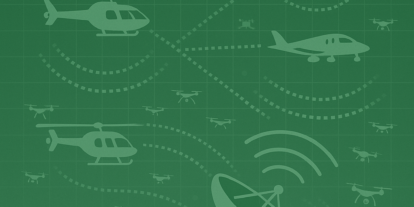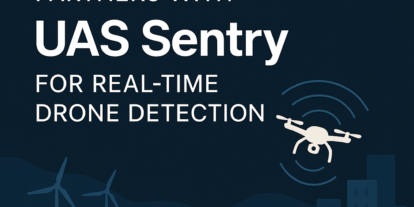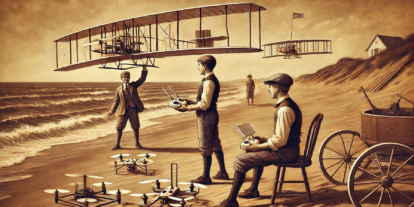 Kittyhawk welcomes Andrew Elefant to the team as our Director of Policy. Andrew will be working with the Kittyhawk team to provide insight into the swiftly-moving world of UAS policy and advocate for UAS-friendly policy at all levels of government.
Kittyhawk welcomes Andrew Elefant to the team as our Director of Policy. Andrew will be working with the Kittyhawk team to provide insight into the swiftly-moving world of UAS policy and advocate for UAS-friendly policy at all levels of government.
Why did you join Kittyhawk?
I joined Kittyhawk to be at the leading edge of helping enterprises adopt and scale drones into their workflows. My goal is to be an advocate for our enterprise customers and help guide policy to facilitate the use of drones in an increasingly sophisticated and safe manner.
The team and culture at Kittyhawk were also a compelling reason to join. I go to work every day with incredibly smart and talented people who are passionate about the drone industry and focused on helping our enterprise customers do more with their drones.
What do you bring to the table?
On the aviation side, I’ve been flying small planes for nearly 20 years while earning my Private Pilot License (Part 61), Instrument and Multi-Engine ratings. I was also one of the first people to get a Part 107 in 2016. Additionally, I lead the drone operations for a San Francisco-based group that assists law enforcement on aviation and disaster-relief matters. Aviation has been a big part of my life for a long time.
On the terrestrial side, I’m an attorney with a background in data privacy and policy. I’ve previously worked as a Research Fellow at a think tank in San Francisco focused on technology policy as it relates to cities and startups. More recently, I have been a cybersecurity consultant for corporate clients focused on enterprise data privacy compliance as it pertains to the General Data Protection Regulation (GDPR).
Lastly, on the operator/enterprise side, I co-founded a small drone services startup and I run a small side business doing aerial photography for real estate agents in the Bay Area.
How did you get into drones?
My passion for drones came from my manned aviation experience and my love for technology.
I began flying in the right seat of single and twin-engine Piper and Cessna aircraft with my father before I was a teenager, and by the time I went to college, I had received my Private Pilot License with an Instrument rating. Eventually, I earned my Multi-Engine rating as well.
In law school, I realized that my intellectual passion was at the intersection of law, policy, and new technology. My background in aviation made drones a natural fit.
Drones or airplanes?
If it flies, I’m interested. There’s no feeling quite like being at the controls while in the air, but I’m consistently and increasingly impressed with the capabilities of drones. They’re so much fun to fly, but more importantly, I’m excited about how useful drones have proven to be in so many enterprise applications, especially compared to traditional solutions.
Also, we are not far off from technology like FPV and VR/AR becoming mainstream, bringing us closer to replicating the sensation of flight. In many ways, we are just scratching the surface of what drones can do.
What was your first drone? What do you fly most often now?
My first drone(s) were a couple of Syma X5C’s in 2015. I wanted to learn how to hand fly a drone before moving onto anything with a GPS or stabilization. I found a small, cheap drone that I wasn’t going to be upset about losing in a tree near my house — which is precisely what happened.
After I became more confident in my flying skills, I purchased a Mavic Pro and got my Part 107 license in 2016. I’ve put hundreds of hours on my Mavic Pro since then at a variety of locations throughout California.
Where is the drone industry going?
As with most new technologies, the drone industry is going to grow both faster and slower than expected. We are just starting to see the building blocks of more complex drone operations take shape. For example, before you can have drone delivery, there needs to be a way to track flights, deconflict between drones, and make operations over people and infrastructure safer. Concepts like UTM, BVLOS and truly autonomous drones require developing standards, making the regulatory environment hospitable to drones, and advocating for increased flexibility and experimentation.
The drone industry is going through an extraordinary phase right now. We are quickly seeing enterprise adoption of drones for tasks that currently exist in their businesses. The exciting part will be technological advances paired with more sophisticated use cases. For example, faster and more secure mobile data, more efficient batteries, and more access to airspace will all drive the drone industry forward.
That’s where Kittyhawk comes in. Kittyhawk is anticipating these advances and their impact on enterprise drone operations to unify the mission, aircraft, and data, and I’m excited to be part of it.
What are the Key policy issues you will focus on?
There are some critical decisions to be made on a policy level in 2018 and beyond. First, I think we will see an update to Part 101 Section 336 in 2018. The hobbyist in me is anxious about any additional regulations which affect hobbyist flights and adds extra layers of confusion and complexity to simply flying a drone. However, as I look to larger enterprises, I understand their frustration regarding unlicensed pilots and unregistered drones. As with manned aviation, there reaches a point where it is not feasible or sustainable to have unregistered, untrackable, and untraceable drones. Accountability is important.
Secondly, the patchwork of regulations being put forth by cities, states, HOAs, and other entities is also reaching a tipping point. Every week I read about another city or community adopting a “drone ordinance” which limits drone operations in some new way. More recently, these ordinances have begun to encroach into areas which are clearly preempted by Federal regulations. Taken in aggregate, this approach has made drone pilots feel more confused and less confident in their ability to fly safely and legally. The drone community, the FAA and Congress need to address this together to develop common-sense solutions that benefit everyone.
 What were the most and least surprising things about your first week at Kittyhawk?
What were the most and least surprising things about your first week at Kittyhawk?
I’m surprised that even with my high expectations, I’m so impressed and inspired by the people I work with and how quickly everyone moves. It feels like everyone is flying around the office developing a cool new feature, speaking with an interesting customer, or planning an exciting way to move Kittyhawk forward.
The least surprising things have been how much I’ve enjoyed living and breathing drones 24/7 and how welcome everyone has made me feel. I’ve gotten to know a lot of the team over the course of the past year by attending Friday Fly Days, so joining Kittyhawk has felt very familiar and welcoming. I’m excited to be on board.
We’re excited to have you on board Andrew and can’t wait to see you fight the good fight!
Jon Hegranes - Aloft CEO
Jon is the Founder & CEO of Aloft, the market leader in drone airspace systems & UTM technologies. Aloft’s patented technology is used in today’s leading recreational, enterprise, and government drone applications.
Jon is a certified commercial drone pilot as part of FAA Part 107, the founder of the Drone Advisory Council, and is an active member of other industry groups, including GUTMA, NBAA Emerging Tech, the FAA’s Advanced Aviation Advisory Committee (AAAC) and working groups, and is a founding member and data working group chair of the FAA Drone Safety Team. He’s a self-taught iOS developer, writes about drone topics for technology news outlets including VentureBeat, TechCrunch, and Forbes, and regularly speaks at industry events such as Commercial UAV Expo, 2B Ahead Future Congress, and DJI AirWorks. Jon graduated from TCU with a major in finance and received his MBA from Thunderbird Global School of Management (ASU). Jon has served on multiple FAA Advisory and Rulemaking Committees (ARCs), including drone detection, counter UAS, and Beyond Visual Line of Site (BVLOS).



